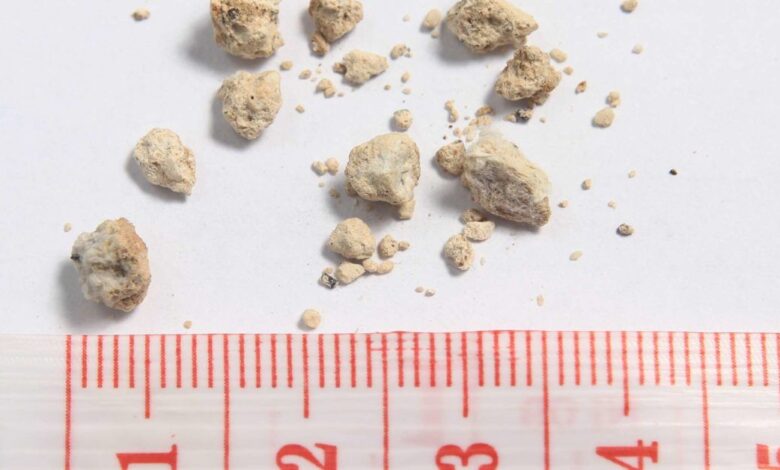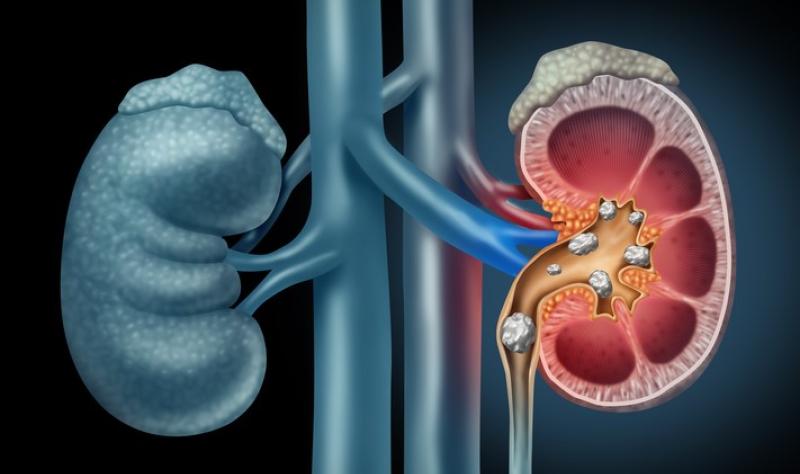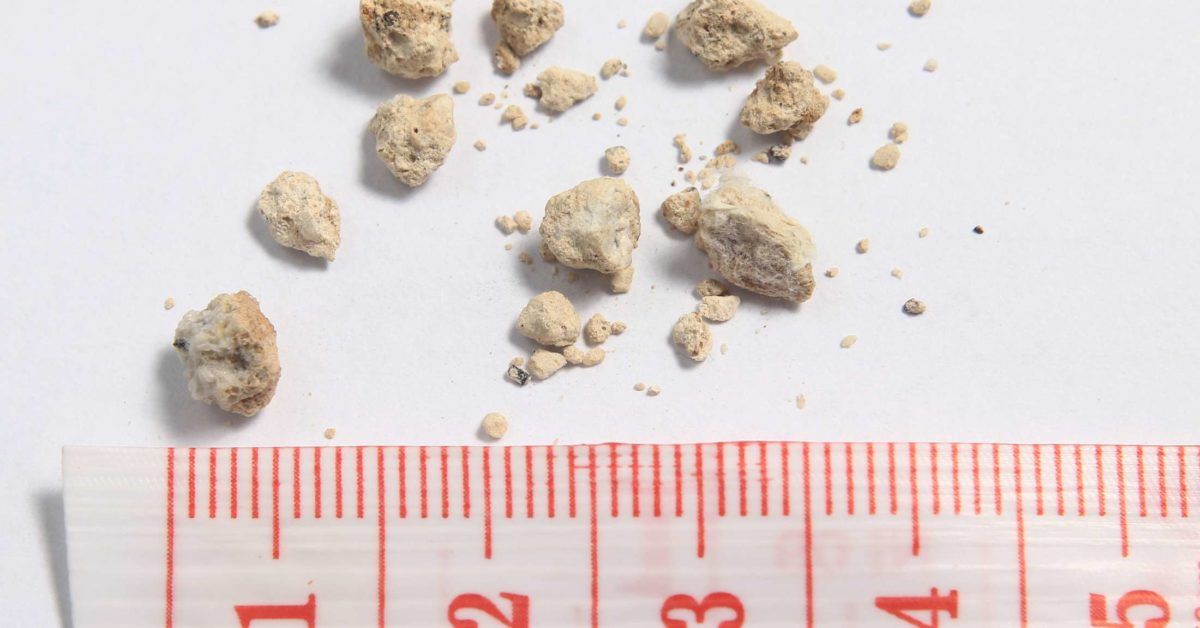
Antibiotics Linked to Increased Kidney Stone Risk
Antibiotics linked to increased risk of kidney stones – it’s a topic that might surprise you, but research is showing a potential connection between these commonly prescribed medications and the painful condition of kidney stones. While antibiotics are vital for fighting infections, understanding their potential side effects is crucial for making informed decisions about your health.
This article explores the research findings, examines the mechanisms involved, and offers insights into how you can minimize your risk of developing kidney stones while taking antibiotics. We’ll delve into specific types of antibiotics, patient groups most susceptible, and strategies for prevention and management.
Antibiotics and Kidney Stone Formation

While antibiotics are essential for treating bacterial infections, some research suggests a potential link between certain antibiotics and an increased risk of kidney stone formation. Understanding this connection is crucial for both healthcare professionals and individuals taking antibiotics.
Potential Mechanisms
The exact mechanisms by which antibiotics might contribute to kidney stone formation are not fully understood, but several theories have been proposed.
- Altered Urinary Composition:Some antibiotics, particularly those that affect the gut microbiome, can alter the composition of urine, leading to changes in pH and the concentration of substances that contribute to stone formation, such as calcium, oxalate, and uric acid. This imbalance can create a favorable environment for stone formation.
- Reduced Urinary Citrate Levels:Citrate is a natural inhibitor of stone formation, helping to prevent calcium from binding to other substances and forming crystals. Certain antibiotics, such as sulfa drugs and tetracyclines, have been associated with reduced urinary citrate levels, potentially increasing the risk of stones.
- Direct Crystallization:In rare cases, antibiotics themselves can act as nucleation sites, directly promoting the formation of kidney stones. This is particularly relevant for certain types of antibiotics, such as sulfonamides, which have been linked to specific types of kidney stones.
Antibiotics Commonly Linked to Increased Risk
While not all antibiotics are associated with an increased risk of kidney stones, certain classes are more commonly linked to this side effect.
- Sulfa Drugs:These antibiotics, including sulfamethoxazole, sulfasalazine, and others, have been consistently associated with an increased risk of kidney stone formation. Their mechanism of action involves altering the urinary environment, leading to higher concentrations of calcium and oxalate, contributing to stone formation.
- Tetracyclines:Tetracycline antibiotics, such as doxycycline and minocycline, have also been linked to an increased risk of kidney stones, primarily due to their potential to reduce urinary citrate levels.
- Trimethoprim:This antibiotic, often used in combination with sulfamethoxazole, has been linked to an increased risk of uric acid stones, primarily through its impact on uric acid metabolism.
Factors Affecting Risk
Several factors can influence the risk of kidney stones in individuals taking antibiotics.
- Pre-existing Conditions:Individuals with a history of kidney stones or other urinary tract conditions may be more susceptible to stone formation while taking antibiotics.
- Hydration:Maintaining adequate hydration is crucial for preventing kidney stones. Antibiotics can sometimes contribute to dehydration, which can increase the risk of stone formation.
- Diet:Dietary factors play a significant role in kidney stone formation. Individuals taking antibiotics should be mindful of their dietary intake, particularly limiting foods rich in oxalate, such as spinach, rhubarb, and chocolate.
Research Findings and Studies: Antibiotics Linked To Increased Risk Of Kidney Stones

Several studies have investigated the association between antibiotic use and kidney stone formation. These studies have employed various methodologies, providing insights into the potential link between these two factors. While some research suggests a possible association, more research is needed to establish a definitive causal relationship.
Key Findings from Major Studies, Antibiotics linked to increased risk of kidney stones
Numerous studies have explored the relationship between antibiotic use and kidney stone formation. Some key findings from these studies include:
- Increased Risk of Kidney Stones:Some studies have reported a higher risk of kidney stone formation among individuals who have used certain antibiotics, particularly those belonging to the sulfonamide class. These studies have often observed an increased risk of up to 20% in individuals who have taken sulfonamides compared to those who have not.
- Specific Antibiotics and Kidney Stone Risk:While sulfonamides have been frequently associated with an increased risk of kidney stones, other antibiotic classes have also been implicated, including quinolones, trimethoprim-sulfamethoxazole (TMP-SMX), and tetracyclines. However, the evidence for these associations is less consistent.
- Dose and Duration of Antibiotic Use:Some studies suggest that the risk of kidney stone formation may be related to the dose and duration of antibiotic use. Higher doses and longer durations of antibiotic use may be associated with an increased risk of kidney stones.
Research Methodologies Employed
Researchers have utilized various methodologies to investigate the association between antibiotic use and kidney stone formation. Some common approaches include:
- Case-Control Studies:These studies compare individuals with kidney stones (cases) to individuals without kidney stones (controls), examining their past antibiotic use. This approach allows researchers to identify potential risk factors associated with kidney stone development.
- Cohort Studies:Cohort studies follow groups of individuals over time, tracking their antibiotic use and subsequent kidney stone development. This longitudinal approach provides valuable information about the temporal relationship between antibiotic use and kidney stone formation.
- Meta-Analyses:Meta-analyses combine data from multiple studies to provide a more comprehensive overview of the association between antibiotic use and kidney stone formation. This approach can increase the statistical power of the findings and enhance the reliability of the conclusions.
Strengths and Limitations of Research Methodologies
Each research methodology has its strengths and limitations.
- Case-Control Studies:Case-control studies are relatively inexpensive and can be conducted quickly. However, they are prone to recall bias, as individuals may not accurately remember their past antibiotic use.
- Cohort Studies:Cohort studies provide valuable information about the temporal relationship between antibiotic use and kidney stone formation. However, they can be expensive and time-consuming, and may be susceptible to attrition bias, where participants drop out of the study.
- Meta-Analyses:Meta-analyses can increase the statistical power of the findings and enhance the reliability of the conclusions. However, they rely on the quality of the individual studies included, and may be subject to publication bias, where studies with positive findings are more likely to be published.
Level of Evidence Supporting the Link
While several studies suggest a possible association between antibiotic use and kidney stone formation, the evidence supporting this link is not definitive. Further research is needed to establish a causal relationship and clarify the specific mechanisms involved.
Risk Factors and Patient Groups
While antibiotics are essential for treating bacterial infections, their use can sometimes contribute to an increased risk of kidney stones. Understanding the factors that elevate this risk and identifying specific patient groups susceptible to this complication is crucial for preventive measures and informed medical decisions.
The risk of developing kidney stones after antibiotic use is not uniform across the population. Certain individuals and patient groups are more prone to this complication due to various factors, including pre-existing health conditions, medications they are taking, and their overall health status.
Patients with Pre-existing Kidney Conditions
Individuals with pre-existing kidney conditions, such as chronic kidney disease (CKD) or a history of kidney stones, are at a heightened risk of developing kidney stones after antibiotic use. These individuals may have compromised kidney function, making them more susceptible to the effects of certain antibiotics.
For instance, some antibiotics can affect the balance of electrolytes in the kidneys, leading to an increased concentration of substances that can form kidney stones.
The potential implications of antibiotic use for patients with pre-existing kidney conditions are significant. In such individuals, antibiotic-induced kidney stone formation can worsen their existing kidney disease, leading to a decline in kidney function and potentially requiring more intensive medical management.
It is crucial for these patients to discuss their antibiotic options with their doctor, who can assess their individual risk factors and prescribe the safest and most effective treatment.
Interactions with Other Medications
Antibiotics can interact with other medications, potentially increasing the risk of kidney stones. For example, certain diuretics, commonly used to treat high blood pressure or fluid retention, can increase the concentration of calcium in the urine, a key factor in kidney stone formation.
When used in combination with certain antibiotics, these diuretics may further elevate the risk of stone formation.
Similarly, some anti-inflammatory medications, such as nonsteroidal anti-inflammatory drugs (NSAIDs), can irritate the kidneys and contribute to stone formation. In some cases, combining NSAIDs with antibiotics might increase the risk of kidney stone formation, especially in individuals with pre-existing kidney conditions.
- Patients taking medications that affect calcium levels, such as diuretics or vitamin D supplements, may be at a higher risk of developing kidney stones when using certain antibiotics.
- Individuals with a history of kidney stones should be particularly cautious about antibiotic use, as they are more prone to stone formation.
- It is essential to discuss all medications, including over-the-counter supplements, with a healthcare professional to identify potential interactions and minimize the risk of kidney stones.
Prevention and Management Strategies
While antibiotics are essential for treating bacterial infections, their association with an increased risk of kidney stones necessitates a proactive approach to minimize this potential complication. By understanding the underlying mechanisms and adopting preventive measures, individuals can significantly reduce their susceptibility to kidney stone formation.
It’s crazy to think that something as simple as taking antibiotics could increase your risk of developing kidney stones. I mean, we all know that antibiotics are essential for fighting infections, but it’s a bit unnerving to learn about this potential side effect.
Speaking of unnerving, did you hear about the Iowa woman arrested for voter fraud scheme ? That’s a whole other level of crazy! Anyway, back to kidney stones, it’s important to be aware of the potential risks associated with antibiotics, and to talk to your doctor if you have any concerns.
Lifestyle Modifications and Dietary Adjustments
Lifestyle modifications play a crucial role in preventing kidney stones. These changes can significantly reduce the risk of stone formation, especially in individuals prone to developing them.
It’s a bummer to learn that antibiotics, which we rely on to fight infections, could also increase the risk of kidney stones. It’s almost as frustrating as dealing with a bank error, like the one Wells Fargo is warning customers about – incorrect balances and missing transactions! While these are very different issues, they both highlight the importance of being proactive about our health and finances.
So, if you’re on antibiotics, maybe consider drinking extra water to help prevent kidney stones. And, of course, keep a close eye on your bank accounts.
- Adequate Hydration:Staying adequately hydrated is essential for preventing kidney stones. Water helps flush out excess minerals and waste products, reducing their concentration in the urine and minimizing the likelihood of stone formation. Aim for at least eight glasses of water per day, and increase your intake if you engage in strenuous physical activity or live in a hot climate.
It’s a tough pill to swallow – literally! Recent research has shown that antibiotics can increase the risk of kidney stones. This is just another reminder that we need to be careful about how we use these powerful drugs.
Meanwhile, our elected officials seem to be more concerned with racking up debt than protecting our health. As voters overwhelmingly concerned about national debt 1 7 trillion omnibus is disaster for our country point out, the recent omnibus spending bill is a disaster for our country.
But hey, at least we’ll still be able to get our antibiotics, right? Just remember, those antibiotics could be making those kidney stones more likely.
- Dietary Adjustments:Dietary modifications can significantly impact kidney stone risk. Reducing your intake of foods high in oxalate, sodium, and animal protein can help prevent stone formation. These include:
- Oxalate-rich foods:Spinach, rhubarb, beets, chocolate, and nuts.
- Sodium-rich foods:Processed foods, fast food, and salty snacks.
- Animal protein:Red meat, poultry, and dairy products.
- Calcium Intake:While calcium is often associated with kidney stones, studies suggest that adequate calcium intake may actually reduce the risk. Calcium binds to oxalate in the gut, preventing its absorption and reducing the amount that reaches the kidneys. Choose calcium-rich foods like dairy products, leafy green vegetables, and fortified foods.
- Regular Exercise:Regular physical activity can help prevent kidney stones by promoting fluid intake and improving overall kidney function. Aim for at least 30 minutes of moderate-intensity exercise most days of the week.
- Weight Management:Obesity is a risk factor for kidney stones. Maintaining a healthy weight through diet and exercise can reduce your risk of stone formation.
Role of Hydration in Preventing Kidney Stones
Hydration is crucial for preventing kidney stones, particularly in individuals taking antibiotics. Antibiotics can alter the composition of urine, making it more concentrated and increasing the risk of stone formation. Adequate fluid intake helps dilute urine, reducing the concentration of stone-forming substances and promoting their excretion.
Adequate hydration is essential for preventing kidney stones, especially in individuals taking antibiotics.
Future Research Directions
While the association between antibiotics and kidney stone formation has been established in several studies, further research is crucial to fully understand the underlying mechanisms and develop effective strategies for prevention and management. This research should focus on identifying the specific antibiotics responsible, the mechanisms by which they contribute to stone formation, and the development of targeted interventions to mitigate the risk.
Identifying Specific Antibiotics
It is important to identify the specific antibiotics that are most strongly associated with kidney stone formation. This requires conducting large-scale epidemiological studies with detailed information on antibiotic use, stone composition, and other relevant factors. This information will help pinpoint the specific antibiotics that pose the greatest risk and inform clinical decision-making regarding antibiotic prescription.
Investigating Mechanisms of Stone Formation
Understanding the mechanisms by which antibiotics contribute to kidney stone formation is crucial for developing effective prevention strategies. Research should focus on:
- Impact on urinary composition:Studies should investigate how antibiotics alter the composition of urine, including changes in pH, mineral concentration, and the presence of inhibitors or promoters of stone formation. For example, some antibiotics may increase urinary calcium excretion or reduce the levels of citrate, a natural inhibitor of stone formation.
- Effects on gut microbiome:The gut microbiome plays a critical role in maintaining urinary health. Research should explore how antibiotics disrupt the gut microbiome and how these disruptions contribute to kidney stone formation. For example, antibiotics can alter the balance of gut bacteria, leading to increased production of metabolites that promote stone formation.
- Interactions with other medications:Some antibiotics may interact with other medications, increasing the risk of kidney stones. Research should investigate these interactions and identify strategies to mitigate the risk.
Developing Prevention Strategies
Based on the findings of research into the mechanisms of antibiotic-induced kidney stones, it will be possible to develop strategies to mitigate the risk. These strategies may include:
- Choosing alternative antibiotics:When possible, physicians should prescribe antibiotics that are less likely to contribute to kidney stone formation. This requires a comprehensive understanding of the risk profiles of different antibiotics.
- Modifying lifestyle factors:Lifestyle modifications, such as increased fluid intake and dietary changes, may help reduce the risk of kidney stones in patients taking antibiotics. For example, increasing fluid intake can dilute urine and reduce the concentration of stone-forming substances.
- Developing novel therapies:Research should focus on developing novel therapies to prevent or treat antibiotic-induced kidney stones. This could include drugs that target specific mechanisms involved in stone formation or therapies that restore the balance of the gut microbiome.
Predicting Individual Risk
Identifying individuals at high risk for developing kidney stones while taking antibiotics is crucial for personalized prevention and management. Research should focus on developing predictive models that incorporate factors such as:
- Genetic predisposition:Some individuals may have a genetic predisposition to kidney stones. Research should identify genetic markers that could be used to predict individual risk.
- Medical history:Previous episodes of kidney stones, family history of kidney stones, and other medical conditions can increase the risk of stone formation. This information should be incorporated into predictive models.
- Lifestyle factors:Lifestyle factors such as diet, fluid intake, and physical activity can influence the risk of kidney stones. These factors should be considered when predicting individual risk.
Clinical Trials
Clinical trials are essential to evaluate the effectiveness and safety of new prevention and treatment strategies for antibiotic-induced kidney stones. These trials should involve large cohorts of patients and be designed to assess the impact of interventions on stone formation, recurrence, and other relevant outcomes.
Public Health Implications
The findings of research on antibiotics and kidney stones have significant public health implications. Public health campaigns should be developed to raise awareness about the link between antibiotics and kidney stones and to promote preventive measures. This could include educational materials for healthcare providers and patients, as well as public service announcements.
Wrap-Up

Understanding the potential link between antibiotics and kidney stones is essential for both patients and healthcare providers. By staying informed about the risks and taking preventive measures, we can work together to minimize the chances of developing this painful condition.
Remember, open communication with your doctor about your medical history and concerns is crucial for making the best choices for your health.

